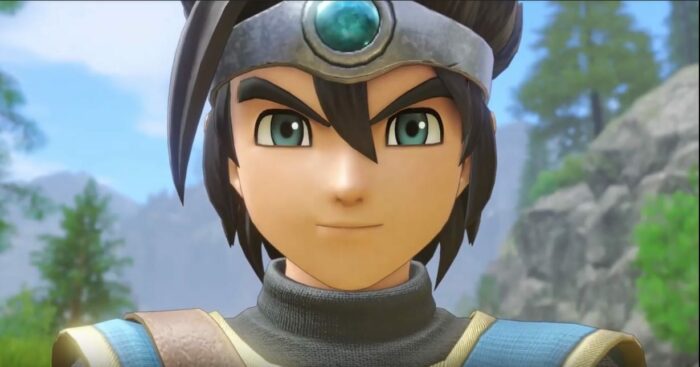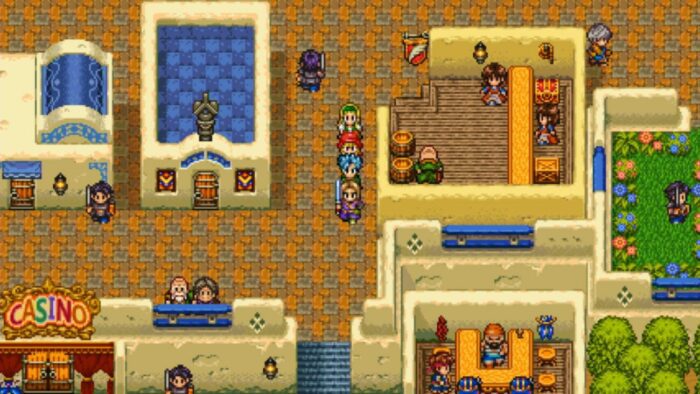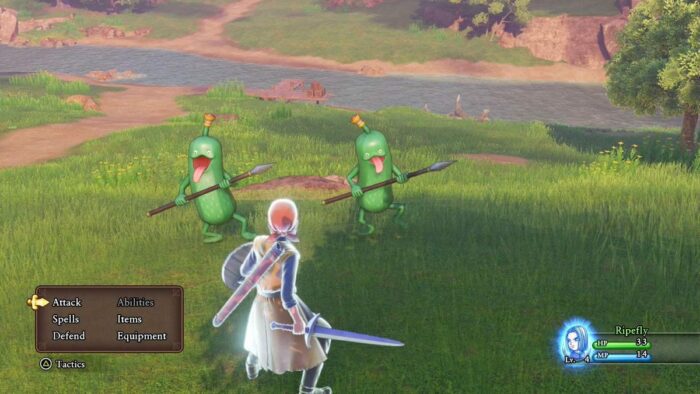Last year saw Dragon Quest XI: Echoes of an Elusive Age come to Switch, and I, being a fan of the franchise, picked it up shortly after its release. For a variety of reasons, I held off on playing it until very recently, but now that I’ve beaten the main story, I’d like to discuss its place in the series and what we can learn from it.
Like the other games in the series, you play as a Chosen Hero, referred to as the Luminary in this installment, and you must set out to defeat an evil that is vague at first. You travel from village to village solving local problems in an episodic fashion. At one point you’ll stumble across a casino, which is rigged much like in real life to keep you addicted, and holds some of the better equipment you can get up to that point. You can find items, forge new equipment, eventually fly through the air, forge a legendary weapon, stop the bad guy (in this case, the villain is named Mordegon) and eventually save the world, fulfilling an ancient prophecy that tells of a destined hero. All things you’ve done in previous games, and the recurring elements come down to the equipment and moves you can learn. The combat is turn based despite the fact that you can run around the battlefield, and the majority of the abilities you can learn are taken from previous games in the series. And yes, the art style is done by Akira Toriyama of Dragon Ball fame, and yes, it’s charming as all hell. It’s all iterative rather than innovative.

That’s kind of the point, though, and none of that is a bad thing. While other long running RPG franchises tend to reinvent themselves over time (most evident in the wildly varied Final Fantasy franchise), the Dragon Quest series tends to stick firmly to its roots with each and every entry, at least when it comes to the main series (there’s a surprising amount of variety when you explore many of the spinoffs), and that is a big part of its appeal. The idea that you more or less know what kind of game you’re in for solidifies it as gaming’s best comfort blanket. And I love the series for that. I own every Western released entry up through 11 (so obviously I don’t have the tenth entry, which was a Japan-only MMO for some reason) and have beaten every single one except for 2 and 3 (just haven’t found the time). I’ve also played a little bit of the spinoffs, mainly the Dragon Quest answer to Pokemon that was Dragon Quest Monsters: Joker on the DS, as well as the surprisingly awesome tank battle-meets-Zelda game Dragon Quest Heroes: Rocket Slime. Point being, I thoroughly enjoy the series, although I wouldn’t recommend playing them all back to back due to the homogeny between titles.
With all that being said, my sort of mini review of Dragon Quest XI is that it’s pretty much the best execution of the established formula in a variety of ways. The graphics are gorgeous, the voice acting is top notch, the characters are all extremely likable, although whether or not they’re the franchise-best cast is up for debate, and the same old tricks that made previous entries compelling remain such in this entry. There are plenty of side quests to undertake, there’s a vast world to explore with hidden secrets and powerful items, and the monster design is top notch, and almost every single name and creature in the game is some kind of wonderful pun. It’s a downright charming game through and through.
The extra content that came with the Switch edition is nothing to sneeze at, either. This version introduces Tickington, a strange town that exists outside of time. It’s inhabited by cute little time ghosts named Tockles, and by discovering these creatures in the overworld, you can unlock new missions in Tickington to undertake. Each mission takes place in one of the worlds from previous games, and you get to interact with characters and dungeons from those entries, as well. This mode is also played entirely in 2D, which is exclusive to Switch. This mode isn’t quite as refined as something like the DS entries, which had great 2D art, and you really need to speed up the battling in the options menu or else you wait an eternity for each turn to pass. But it’s truly impressive that the developers took the time to redo the entire game in 2D, which makes it feel like even more of a throwback RPG than it already is. Plus, Tickington offers some great fan service and offers up a surprisingly meaty amount of extra content that rounds out an already very content-rich game.

In many ways, Tickington is actually very thematically appropriate for the game’s main story. It is, essentially, all about the past. It deal’s heavily with the hero’s royal origins and his troubled past (his home castle was destroyed and his parents were killed when he was younger), and the broader scope of the narrative is about living up to your legacy. In this game’s lore, the hero is actually a reincarnation of another ancient hero named Erdwin who was himself the Luminary and put an end to a reign of terror ages ago. The main struggle of the hero is managing to live up to that legacy, and it can’t help but feel like an extremely meta-commentary on the franchise as a whole.
The original game dropped back in 1986 on the NES, and has been a mainstay for many fans of RPGs ever since. Point being that it has quite the legacy, and I can’t help but wonder if series creator Yuji Hori felt intimidated by his own creation. After all, it’s very difficult to get away with doing the same thing over and over again with each entry, but somehow, Dragon Quest has found a way to stand out by essentially being as generic as possible (and I don’t mean that as a bad thing here). On the whole, the eleventh entry most certainly does justice to its own past, but it comes with a caveat. I think it’s time for the series to look to the future now.
That’s not to say that the series should dramatically reinvent itself with the twelfth installment, which is apparently in the works as of the time of this writing. But even up to this point, the series seems almost afraid to make any sort of change whatsoever, outside of letting you dual wield certain weapons. Take, for instance, the abilities your characters can learn. Combat on the whole isn’t terribly challenging (at least on Normal, which is what I played on), but certain abilities are, in theory, quite useful. For instance, Jade, the game’s martial artist, has a few moves that can put enemies out of commission for a couple of turns. She has Leg Sweep, which can trip enemies so they can’t get up, and another where she performs a Puff Puff (Google it, I’m not describing it here, but it is a recurring thing in the series) to stun the enemy party.
The thing is that in the eleventh entry, these abilities are largely pointless, and in fact have always been pointless. The Dragon Quest series has a weird history with support abilities in that they have a seemingly very low chance of working. There were times during my playthrough I would try and use Leg Sweep on a particularly powerful foe, and absolutely nothing would happen. Same with Puff Puff, and many other abilities that supposedly weaken the opposing party (Sylvando’s whip abilities, which are supposed to be able to do everything from putting enemies to sleep to stunning them, are particularly guilty of this) have such low success rates that you’re better off using your turn just attacking or healing. Even spells like Zing, a series staple, still doesn’t have a guaranteed success rate, which is just baffling at this point. There’s nothing more frustrating than wasting turn after turn trying to resurrect a fallen party member due to the bafflingly low success rate of the spell.

The same goes for combative abilities and spells. There’s a weird through line in each game where magic is less and less useful as the game goes on. In the early stages, it’s indispensable, but later on, the scales tip in favor of melee fighters. Whereas melee focused characters like the Hero and Erik can be buffed and use certain abilities to deal more damage, offensive magic users don’t have that luxury of being able to increase their damage output, which is largely tied to the individual spell you’re using.
Meanwhile, take the Sword skill tree the hero has access too. He can get skills like Metal Slash, which supposedly deals more damage against metal enemies, and Flame Slash, which adds a general damage buff to his attack. Both of these abilities seemed to simply deal marginally more damage whenever I used them, but the ability Falcon Slash, which lets the Hero attack twice, is almost a requirement as soon as you gain access to it. With the right setup (including dual wielding swords), you can absolutely mow down any competition, to the point that it’s almost pointless to even consider using his other sword abilities.
Once again, this is something I’ve noticed about past games too. I quite enjoy the sixth entry in the franchise, which allows players to explore two versions of the overworld and assign Jobs to different characters. The problem with that game was that the job system was horribly unbalanced. For instance, Gladiators were able to learn all kinds of great physical abilities, and had great stats. But the Luminary (which, in this case, is supposed to be a support class based around dancing), has awful stats and learns marginally useful skills at best. Sure enough, though, once you learn Falcon Slash in Dragon Quest VI, all other physical abilities pale in comparison.
In other words, the series keeps making the same balancing mistakes over and over again, and I have to wonder why. Is it done out of a sense of nostalgia? Like, is it an “It’s always been this way, so we can’t change it now” mentality? To me, that is fundamentally misunderstanding the appeal of the Dragon Quest games. It’s more about the atmosphere of adventure and whimsy they create, the familiarity of the way they’re structured, and the rock-solid localizations which are filled with puns and wordplay. As someone who has played and enjoyed most of the main entries in the series, it was disheartening to see that Dragon Quest XI repeated many of the same mistakes of its predecessors.
And this is what I’m talking about when I say that the franchise can now move on from the past. More than any other entry, XI is about looking to the past for answers, and living up to that legacy. It does it well, for the most part (although I do have some pacing issues with the game’s second half). It feels almost like a grand, 60 hour long celebration of the series as a whole, but I would have loved for the fine details to have been tweaked to deliver a more cohesive, customizable experience.
Most modern JRPGs live and die by their battle systems, and the best ones are able to offer players flexible party building and customization. Dragon Quest XI assigns classes to characters with no ways to change them, but even within the context of that linear party building, many of the abilities you learn are simply not very useful, especially as you get into the end game and post-game. The ninth entry, was functioned as a co-op mini MMO and actually stands tall as one of my most played RPGs ever, kind of attempted the idea of letting players build their own party by allowing them to choose the exact classes each character took on, but, like all the other games, there was serious balancing issues where some classes just weren’t worth it.
I want the supposedly-in-development twelfth entry to completely rebalance the game. Keep the visual style, keep the enemies (maybe throw in a few new ones), keep the episodic structure, keep the iconic aesthetic, but change up the battling and abilities. Make abilities that weaken the enemy party actually useful. Take away their low success rates. Make Zing work every time so you don’t waste turns in battle trying and failing to resurrect fallen allies. Rebalance the game so that players can tweak their party to suit their exact play style, and make every build viable. Just because something has always been done a particular way doesn’t mean there isn’t room for improvement.

At the end of the day, Dragon Quest XI is a fine send off for the series’ history. It is a reiteration of all that came before, and even lets players travel to its own past with the Tickington bonus content. But at some point, it’s going to have to look in another direction. At some point, it will have to look to the future and make some big changes if it hopes to stay relevant. If Dragon Quest XI was a refinement of everything we already know and love, I want Dragon Quest XII to introduce new or different gameplay ideas. As much of a fan as I am of the series, I think it’s time for it to introduce something new while retaining the tone the it’s famous for. Change can sometimes be a very good thing.

